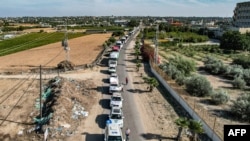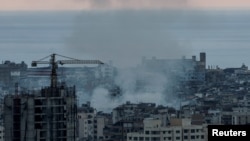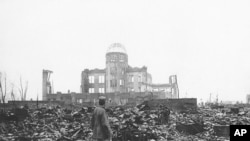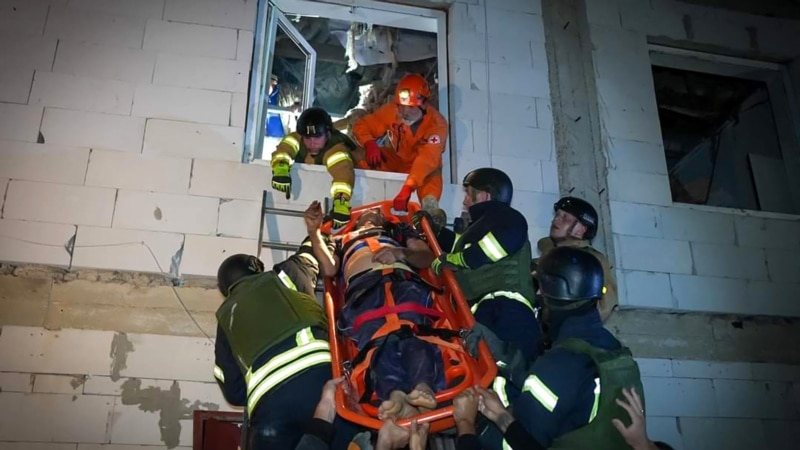The latest:
- U.S. President Joe Biden and Israeli Prime Minister Benjamin Netanyahu discussed developments in Gaza.
- 14 additional trucks used the Rafah border crossing to carry aid into Gaza
- The Israel-Hamas war, in its 16th day, has become the deadliest of five Gaza wars.
- More than 1,400 people in Israel have been killed, mostly in the initial Hamas attack on Oct. 7.
- The Palestinian Health Ministry said the death toll in Gaza had reached at least 4,651 people, with another 14,254 people injured.
- Netanyahu visited troops stationed near the border with Lebanon.
Israel stepped up its strikes on Sunday, striking the Gaza Strip, two airports in Syria, as well as targets in Lebanon, amid concerns that the conflict between Israel and militant group Hamas could turn into a wider Middle East war.
Israeli Prime Minister Benjamin Netanyahu visited troops stationed near the border with Lebanon, where the Israeli army and Iran-backed Hezbollah militants have clashed. On Saturday, an official with Iran Hezbollah threatened Israel if it began a ground offensive in the Gaza Strip.
On Sunday, Netanyahu warned Lebanon’s Hezbollah militant group that if it launches its own war, “we will cripple it with a force it cannot even imagine.”
Amidst the attacks, a second aid convoy destined for desperate Palestinian civilians traveled through the Rafah border crossing into Gaza on Sunday.
U.N. relief chief Martin Griffiths tweeted on X, formerly Twitter, “14 more trucks have entered Gaza today through the Rafah border crossing, with aid provided by the @EG_Red_Crescent and the @UN.”
Hamas said at least 55 people were killed overnight in Israeli airstrikes conducted on the Gaza Strip, where Israel has maintained a steady drumbeat of attacks since the Hamas operation that killed more than 1,400 people in Israel earlier this month.
The Palestinian Health Ministry said on Sunday that the death toll in Gaza had reached at least 4,651 people, with another 14,254 people injured.
In Syria, state news agency SANA said Israeli missiles hit the airports in the capital of Damascus and the northern city of Aleppo, damaging their runways. It said one airport worker was killed in the attacks and one was injured. Flights have been transferred to Latakia Airport.
Israeli forces have struck both the Damascus and Aleppo airports several times over the past year. The Times of Israel said Israel is believed to be attempting to prevent the shipment of weapons from Iran to Middle East proxies, the most prominent being Lebanon-based Hezbollah.
Meanwhile, Israeli authorities announced Sunday that 14 Israeli communities near the Lebanese border will be evacuated. The locations have been subjected to rocket and missile attacks from Iran-backed Hezbollah and Palestinian groups since the deadly October 7 Hamas attack on Israel.
The leaders of the United States, Canada, France, Germany, Italy and Britain on Sunday discussed the Israel-Hamas war during a telephone call convened by U.S. President Joe Biden.
In a joint statement, they underscored their support for Israel and its right to defend itself, but also urged it to adhere to international humanitarian law and protect civilians. They also welcomed the release of two hostages and called for the immediate release of all remaining hostages.
U.S. Defense Secretary Lloyd Austin and Secretary of State Antony Blinken both said in interviews Sunday the United States is concerned about the Israel-Hamas war expanding in the Middle East.
Austin told ABC’s “This Week” show, “We’re concerned about potential escalation…a significant escalation.” But he said the U.S. has “the ability to respond,” noting that a U.S. Navy warship shot down drones launched from Yemen that might have been headed toward Israel.
“We maintain the right to defend ourselves and we won’t hesitate to respond,” Austin said.
Blinken told NBC’s “Meet the Press” show, “We expect that there’s a likelihood of escalation. Escalation by Iranian proxies directed against our forces, directed against our personnel.
“We are taking steps to make sure that we can effectively defend our people and respond decisively if we need to,” the top U.S. diplomat said. “This is not what we want, not what we’re looking for. We don’t want escalation. We don’t want to see a second or third front develop. We don’t want to see our forces, or our personnel come under fire. But if that happens, we’re ready for it.”
Blinken said the U.S., while warning Hezbollah against expansion of fighting against Israel from Lebanon, has “deployed very significant [military] assets to the region, two aircraft carrier battle groups, not to provoke, but to deter, to make clear that if anyone tries to do anything, we’re there.”
Israeli fighter jets struck Hezbollah targets in Lebanon on Saturday. Hezbollah said that six of its fighters were killed Saturday on the border, increasing to 19 the number of its fighters killed in the last two weeks.
The Israeli military said one of its soldiers on the border was hit by an anti-tank missile and severely wounded.
The fighting along the Lebanon-Israel border is the worst since the 2006 war between Israel and Hezbollah.
White House Bureau Chief Patsy Widakuswara and United Nations correspondent Margaret Besheer contributed to this article. Some information for this report came from The Associated Press, Agence France-Presse and Reuters.








